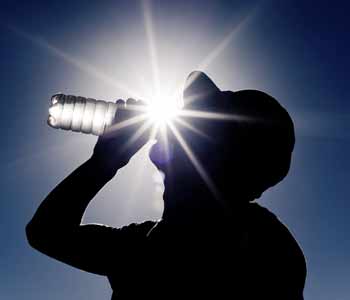April Safety Tip: Beating the Heat by Staying Hydrated
Apr 03, 2019

How you can avoid dehydration on the job?
In the simplest terms, dehydration occurs when you lose more water than you take in. Staying hydrated is important to keep all your body functions running smoothly. Because in an agricultural setting you work outdoors or in warm environments, you’ll want to take extra precautions to stay hydrated as summer heats up.
Losing Water
On average, adults lose almost 10 cups of water a day simply by doing everyday tasks such as sweating, breathing and going to the bathroom. When we sweat, we also lose electrolytes, which includes minerals such as sodium, potassium and calcium. These minerals help maintain the proper balance of fluids in the body.
Signs of Dehydration
You may be suffering from dehydration if you begin to experience one or more of the following symptoms:
If you feel like you may be showing some of these signs, don’t ignore it! Immediately take a break and give yourself time to recover. In its worst cases, dehydration can lead to heat stroke or even death, so you should take any symptoms you may have seriously.
Prevention
The best defense against dehydration is prevention. That sounds easy enough–consume lots of fluids and foods high in water such as fruits and vegetables–but determining how much fluid can be complex.
Unfortunately, determining appropriate water intake isn't an exact science, especially because so much depends on age, physical condition, activity level, location and body chemistry. The best overall approach is to make a conscious effort to stay hydrated. In hot weather, skip coffee or soda, and make water your beverage of choice.
Break it Up
During periods of heavy exertion, take frequent water breaks. Adjust your intake to match your activity level and working conditions to stay healthy and alert.
In the simplest terms, dehydration occurs when you lose more water than you take in. Staying hydrated is important to keep all your body functions running smoothly. Because in an agricultural setting you work outdoors or in warm environments, you’ll want to take extra precautions to stay hydrated as summer heats up.
Losing Water
On average, adults lose almost 10 cups of water a day simply by doing everyday tasks such as sweating, breathing and going to the bathroom. When we sweat, we also lose electrolytes, which includes minerals such as sodium, potassium and calcium. These minerals help maintain the proper balance of fluids in the body.
Signs of Dehydration
You may be suffering from dehydration if you begin to experience one or more of the following symptoms:
- Excessive thirst
- Sleepiness or tiredness
- Dry mouth
- Muscle weakness
- Headache
- Dizziness or lightheadedness
If you feel like you may be showing some of these signs, don’t ignore it! Immediately take a break and give yourself time to recover. In its worst cases, dehydration can lead to heat stroke or even death, so you should take any symptoms you may have seriously.
Prevention
The best defense against dehydration is prevention. That sounds easy enough–consume lots of fluids and foods high in water such as fruits and vegetables–but determining how much fluid can be complex.
Unfortunately, determining appropriate water intake isn't an exact science, especially because so much depends on age, physical condition, activity level, location and body chemistry. The best overall approach is to make a conscious effort to stay hydrated. In hot weather, skip coffee or soda, and make water your beverage of choice.
Break it Up
During periods of heavy exertion, take frequent water breaks. Adjust your intake to match your activity level and working conditions to stay healthy and alert.
Be safe and healthy on the job at Sunrise Cooperative Inc with these helpful tips provided by USI Insurance Services.